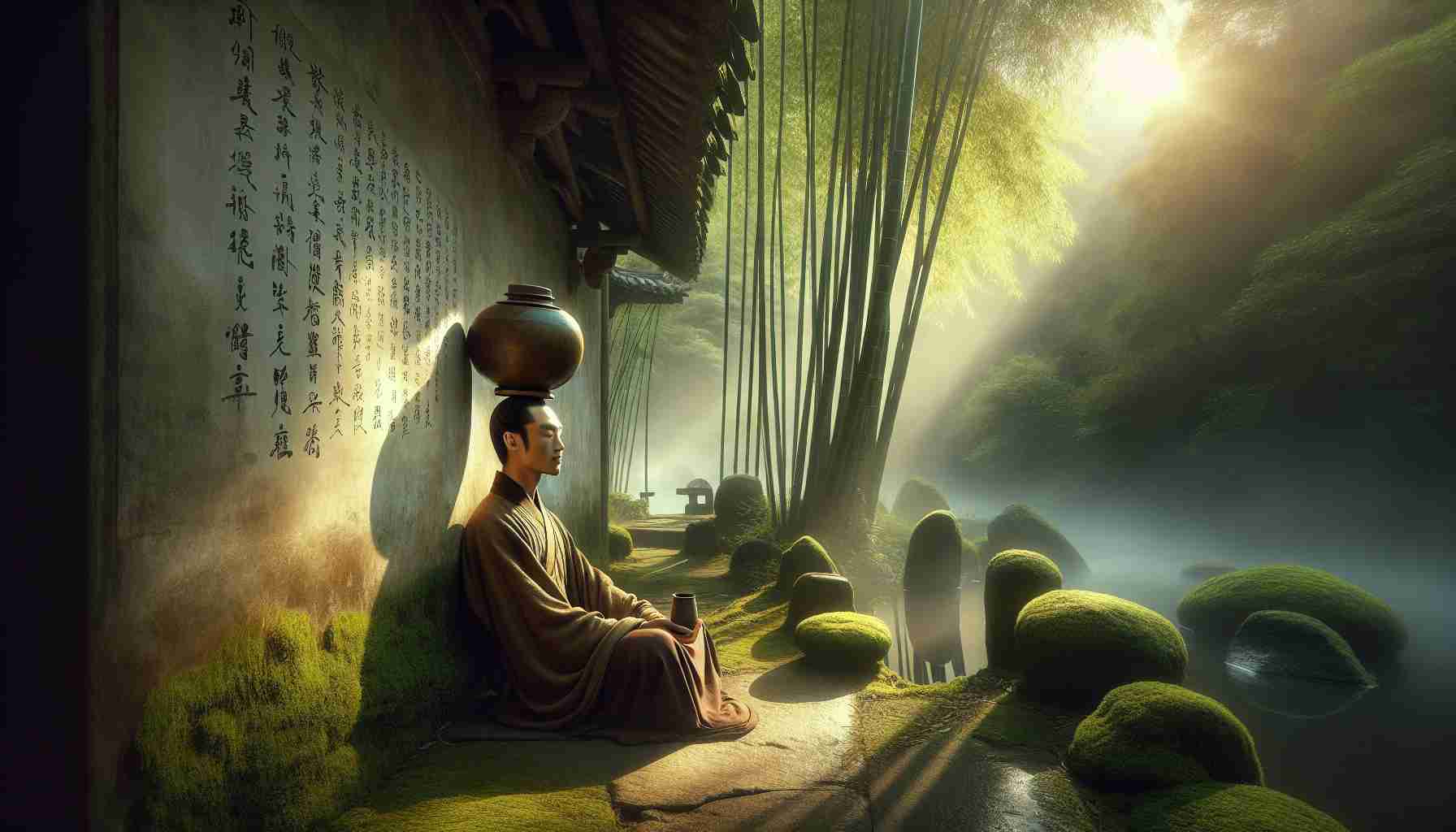

The bamboo trees swayed gently in the wind, and I could hear the river whispering to itself nearby. I sat by the old garden wall, trying to balance a pot on top of my head. “Stillness,” Master Shen always said, “is harder than motion. Can you sit without doing?”
I was twelve years old and very bad at doing nothing.
My name is Yun, and I lived at the Temple of Still Winds, a small place on the edge of the mountain forests. The monks there lived quietly. They cooked simply, moved gently, and laughed softly. I had come to live with them after getting into too many fights back home. My parents thought I needed peace. I thought peace was boring.
One morning, while I was trying to sneak past chores by pretending to meditate, Master Shen chuckled. He was old—very old—and his beard flowed down like water. Instead of scolding me, he sat beside me and looked out at the rising mist.
“Do you know the story of the ancient masters from Laozi’s time?” he asked.
I shook my head.
“They were like the wind moving through tall grass—soft, quiet, and unnoticed, but strong in their stillness,” he said. “Laozi, the old teacher, once said they moved carefully, like someone crossing an icy stream. Their steps were slow, their hearts calm. They didn’t force life. They flowed with it.”
“Sounds like they did nothing,” I muttered.
Master Shen smiled. “That is exactly why they did everything.”
I didn’t understand, not then.
But later that day, I was sent to fetch water. I groaned the whole way to the stream, stomping and tripping over roots. When I filled the bucket too quickly, it tipped and spilled. I growled and kicked a rock.
Taking a deep breath, I remembered what Master Shen had said. “Move like someone walking on ice.”
So the next time, I slowed down. I stepped carefully, quietly. I watched the water flow into the bucket. I didn’t rush. And something strange happened—nothing went wrong. The bucket didn’t tip. The water stayed still. I walked back calmly, and I didn’t spill a drop.
It felt… nice.
That night, Master Shen nodded as I bowed. He said nothing, and he didn’t need to. I was starting to understand.
Each day after that, I tried doing just a little bit less. Not by being lazy—but by not forcing things. When I stopped fighting every moment, things got easier.
I learned that peaceful action is still action. Laozi’s teaching of Wu Wei—doing without forcing—wasn’t about being lazy. It was about listening, waiting, and moving when the moment is right.
I didn’t change overnight. But now, whenever I start rushing, I remember the stream, the story of the quiet masters, and the simple truth: Sometimes, the best way forward is to be still.
And slowly, I began to walk the Way.
The bamboo trees swayed gently in the wind, and I could hear the river whispering to itself nearby. I sat by the old garden wall, trying to balance a pot on top of my head. “Stillness,” Master Shen always said, “is harder than motion. Can you sit without doing?”
I was twelve years old and very bad at doing nothing.
My name is Yun, and I lived at the Temple of Still Winds, a small place on the edge of the mountain forests. The monks there lived quietly. They cooked simply, moved gently, and laughed softly. I had come to live with them after getting into too many fights back home. My parents thought I needed peace. I thought peace was boring.
One morning, while I was trying to sneak past chores by pretending to meditate, Master Shen chuckled. He was old—very old—and his beard flowed down like water. Instead of scolding me, he sat beside me and looked out at the rising mist.
“Do you know the story of the ancient masters from Laozi’s time?” he asked.
I shook my head.
“They were like the wind moving through tall grass—soft, quiet, and unnoticed, but strong in their stillness,” he said. “Laozi, the old teacher, once said they moved carefully, like someone crossing an icy stream. Their steps were slow, their hearts calm. They didn’t force life. They flowed with it.”
“Sounds like they did nothing,” I muttered.
Master Shen smiled. “That is exactly why they did everything.”
I didn’t understand, not then.
But later that day, I was sent to fetch water. I groaned the whole way to the stream, stomping and tripping over roots. When I filled the bucket too quickly, it tipped and spilled. I growled and kicked a rock.
Taking a deep breath, I remembered what Master Shen had said. “Move like someone walking on ice.”
So the next time, I slowed down. I stepped carefully, quietly. I watched the water flow into the bucket. I didn’t rush. And something strange happened—nothing went wrong. The bucket didn’t tip. The water stayed still. I walked back calmly, and I didn’t spill a drop.
It felt… nice.
That night, Master Shen nodded as I bowed. He said nothing, and he didn’t need to. I was starting to understand.
Each day after that, I tried doing just a little bit less. Not by being lazy—but by not forcing things. When I stopped fighting every moment, things got easier.
I learned that peaceful action is still action. Laozi’s teaching of Wu Wei—doing without forcing—wasn’t about being lazy. It was about listening, waiting, and moving when the moment is right.
I didn’t change overnight. But now, whenever I start rushing, I remember the stream, the story of the quiet masters, and the simple truth: Sometimes, the best way forward is to be still.
And slowly, I began to walk the Way.